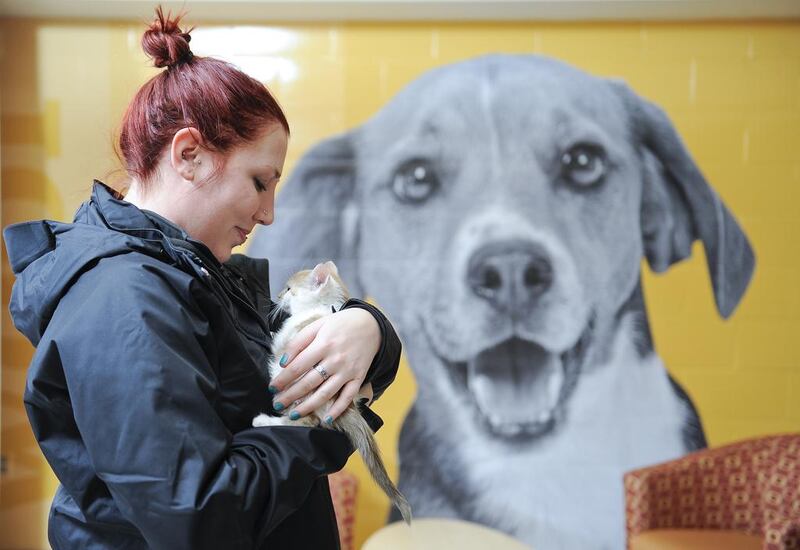Are you a cat person or a dog person? Be careful how you answer because new research suggests it may reveal a lot about your personality.
The idea that choice of pet says something about people is nothing new; Mark Twain once remarked that, “when a man loves cats, I am his friend and comrade, without further introduction”. Yet only now are scientists starting to take the idea seriously.
And what they’re finding has implications, not only for the pet owners themselves, but for their pets – and, potentially, their partners and children.
To study the link between personality types and pet ownership, psychologists at the University of California, Berkeley, recruited more than 1,000 pet owners using social networking sites, such as Facebook.
Each was then given a questionnaire to establish the link between personality types and that most notorious division of humanity: those who prefer dogs to cats, and vice versa.
The results, published in the current issue of the Journal of Applied Animal Welfare Science, are likely to annoy both camps.
Dog people – who outnumbered ailurophiles two-to-one – emerged as more outgoing and secure types of people, but also less adventurous.
Cat lovers, on the other hand, emerged as more creative and adventurous, but more anxious.
There was some common ground, however. Those with the greatest affection for either type of pet rated high on conscientiousness – that is, more likely to be self-disciplined, exacting and well-prepared.
But recruiters thinking of hiring only job applicants with lots of pets, beware.
Such people also rated highly for neuroticism, making them moody and anxious.
In short, this early foray into the links between pet ownership and personality does reveal something about ourselves – but it’s clearly far from simple.
By contrast, the relationship our pets have with us is very straightforward. After all, they don’t have anything like our complex personalities.
Or do they?
Again, many people insist animals have human-like traits, yet scientists have largely been dismissive of such claims.
Such scepticism was not shared by Charles Darwin, the founder of the theory of evolution.
Given the many physical traits we share with animals, he saw no reason why they should not have personalities.
The difficulty, of course, lies in proving it. Every animal behaviourist knows the salutary tale of Clever Hans, the horse with human-like traits that made headlines in the early 1900s for seemingly being able to stamp out the answer to his owner’s arithmetic challenges, which he got right about 90 per cent of the time.
News of his abilities prompted an investigation by a committee of experts, but they could find no evidence of trickery.
The real explanation, identified by a German psychiatrist, was more disquieting.
Experiments revealed that Hans would start stamping out the answer, stopping only when he saw a subtle shift in his owner’s stance when the right answer had been reached.
For scientists, the lesson was clear: those seeking to ascribe human-like traits to animals run the risk of self-deception.
Such self-deception looms especially large when that trait is one as slippery as “personality”. After all, what one person regards as snarling aggression in a dog may be seen as playfulness by his owner.
To counter this, researchers use multiple and independent observers and check for consistent assessments of traits well established in humans.
The best-known of these are the so-called “Big Five”: neuroticism; extroversion; conscientiousness; openness to experience; and agreeableness (essentially, warmth and willingness to cooperate). Observers also do more than judge whether individual animals do or do not have a certain trait: they grade them from, say, the most neurotic to least neurotic and look for consistent rankings.
As such, scientists are discovering personality traits in an astonishing variety of animals.
Many of the findings focus on “higher animals”, such as apes, dogs and cats.
These have confirmed that individuals really can manifest consistent traits, such as extroversion and neuroticism, which lead them to behave differently from others.
But these same traits are now being found in less exalted creatures.
For example, studies have identified shy, retiring octopi that prefer staying in their dens rather than taking part in mass feeding. They will even go as far as using their camouflage to hide from their bolder, more extrovert companions.
As with humans, the personality of animals can affect their success in life. Researchers in Finland have recently reported that some brown trout score consistently highly on a trait akin to openness to experience.
While often a good thing in humans, it can prove fatal for brown trout because it leads them to investigate interesting new things in their environment ... like fish hooks, leading to an early demise.
It’s a similar story with freshwater crayfish. Last month, researchers at Deakin University in Victoria, Australia, reported finding that some of these crustaceans have big, bold personalities, making them fast-growers – but also more likely to be caught. In contrast, the more retiring types stay out of trouble longer.
This means differences in crayfish personality are leading to fishing grounds being dominated by timid and, thus, slow-growing fish, which has serious commercial implications.
Such research may force a rethink in our attitudes to other organisms – even those we’re not fond of.
Robert Matthews is visiting reader in science at Aston University.






